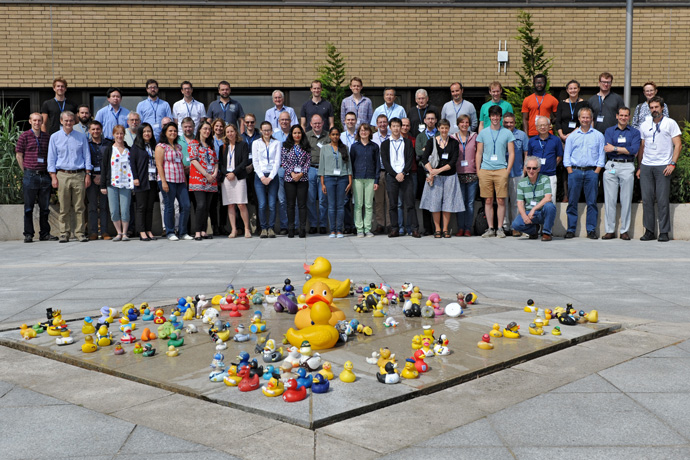ECMWF | Reading | 10-12 July 2018

Workshop description
This workshop aimed to bring together the growing community of scientists who have an interest in discussing and improving process coupling in geophysical modelling.
Weather and climate models include complex representations of processes that span timescales from seconds to centuries. Only parts of these processes are explicitly resolved by the prognostic equations discretised in time and space and solved by the numerics of the model dynamical core. Unresolved subgrid-scale transport ("turbulence'') and diabatic processes such as radiative transfer, chemistry and cloud processes have to be parametrized and then solved separately by sub-models, the physical parametrizations, which have their own simplified equations, own hypotheses and often own numerical solvers. More generally, realistic modelling of any complex geophysical fluid can be achieved in practice only by splitting the full complexity of the system into individual processes. Then, a consistent, accurate and efficient coupling between the processes is essential in order to ensure the correct representation of all the feedback mechanisms that control the evolution of geophysical fluids.
The coupling between the different geophysical components in a global Earth system model is also subject to similar problems, in particular in terms of thermodynamic consistency and more generally the numerical treatment of processes across the interfaces between atmosphere, hydrosphere, cryosphere and biosphere.
Consequently, the scope of the workshop extended beyond the coupling between an atmospheric dynamical core and its physical parametrizations. It also included a discussion about optimal strategies for coupling processes in and/or between the different component models of the Earth system. Of particular interest for this workshop were contributions with a focus on the interactions of physical modules across Earth system components and the numerics of the coupling.
Topics of interest
The PDC18 workshop provided a forum to share experiences and ideas on the following topics:
- Conceptual issues in model or process formulation, including conservation and consistency
- Discretization of individual processes and process interactions
- Solution sensitivity to static or dynamic adaptation in spatial and temporal resolutions
- Test strategies, results, and intercomparisons
- Optimization, algorithmic efficiency and high-performance computing
Presentations
Tuesday 10 July 2018
|
A multi-fluid approach for the representation of convection |
|
|
A well-posed and stable coupling procedure for the compressible and incompressible Navier-Stokes equations |
|
|
Variational-metriplectic formulations of compressible, multiphase, multicomponent geophysical fluids |
|
|
Time integration methods and dynamic-physics coupling |
|
|
Scalar Conservation Mapping in Physics Dynamics Coupling (PDC) |
|
|
An efficient integrated dynamics-physics coupling strategy for global cloud-resolving models |
|
|
Assessing and Improving the Numerical Solution of Atmospheric Physics in an Earth System Model |
|
|
Analyzing Physics-Dynamics Coupling in an Ensemble of Simplified GCMs |
|
|
Reduced Complexity Frameworks for Exploring Physics Dynamics Coupling Sensitivities |
|
|
Physics coupling with the Finite-Volume Module of the IFS |
|
|
REMOTE PRESENTATION: Evaluating time step and resolution sensitivities in the GEOS analysis and forecast system |
|
Wednesday 11 July 2018
|
Across the ‘grey zone’ of ocean model resolutions |
|
|
Representation of air-sea interactions on an idealized coupled atmosphere-ocean model with focus on the Western Baltic Sea |
|
|
A simple model of a balanced boundary layer coupled to a large-scale convective circulation |
|
|
On the discretization of vertical diffusion in the turbulent planetary boundary layer |
|
|
Exploring the impacts of stochastic representations of model uncertainties |
|
|
Reduced numerical precision guided by physics-dynamics coupling |
|
|
Physics-dynamics coupling with element-based high-order Galerkin methods: quasi equal-area physics grid |
|
|
Coupling convection with the continuity equation |
|
|
Coupling the parametrised deep convection with the resolved flow in the IFS via the divergence of mass flux |
|
|
Coupling isobaric physics with isochoric dynamics |
|
Thursday 12 July 2018
|
The future of coupled modeling at the NWS |
|
|
Parallel Physics-Dynamics Coupling in an Atmosphere Model |
|
|
Physics-dynamics coupling experiments in the UM |
|
|
Convergence and performance aspects of physics-dynamics coupling in US-DOE research |
|
|
Outcomes from the PDC sessions at the Second Pan-GASS meeting |
|
|
Improving climate model coupling through complete mesh representation |
|
Scientific Organising Committee
Sylvie Malardel (ECMWF)
Michail Diamantakis (ECMWF)
Markus Gross (CICESE)
Christiane Jablonowski (U Michigan)
Hui Wan (PNNL)
Nigel Wood (Met Office)
Local Organising Committee
Karen Clarke
Sylvie Malardel
Michail Diamantakis
Nils Wedi
